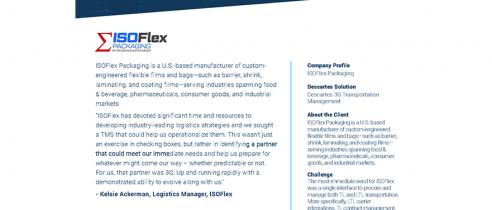When your transportation management system (TMS) is acquired, you could face disruptions in service, weakened data security, and a decline in support quality — potentially jeopardizing your entire supply chain and sinking your reputation. It’s a huge deal for a shipper or 3PL.
A TMS acquisition can dramatically affect how you manage logistics operations, the relationships you’ve built with account managers, and your overall costs.
While change isn’t always bad, uncertainty can be. Prepare for the possibilities of an acquisition by reviewing these five potential changes your operation could experience if your TMS provider is acquired by another company.
1. New Account Managers and Support Staff
One of the first things you might notice after a TMS acquisition is new faces on your account management and support teams.
The acquiring company will likely restructure roles or bring in their own staff, which means the familiar team you’ve worked alongside and developed rapport with — as well as the relationship you’ve painstakingly established with them — could be in jeopardy.
During this transition, you may experience slower response times or inconsistent support as new team members get up to speed on your account. This adjustment period can affect how quickly issues are resolved and how smoothly your operations run.
Maintaining a strong line of communication with your new account managers is critical during this time. Stay proactive and make sure any unique needs you have are communicated early on, so the new team knows how to best support your organization.
2. Changes in Pricing and Billing Structures
Pricing changes are a common outcome of acquisitions. The acquiring company might adjust rates or introduce new billing models to align with their corporate policies. For logistics professionals, this can mean sudden, unexpected cost increases — sometimes without clear justification.
You might also encounter new fees or hidden charges that weren’t part of your original contract, leading to frustration and budget strain.
It’s important to thoroughly review any new contracts or billing terms introduced post-acquisition. Ensure you fully understand what your new TMS provider is charging you for — and why. Don’t be afraid to negotiate for pricing that better aligns with the value you’re receiving.
3. Shifts in the Product Roadmap
When a company is acquired, its product roadmap often changes to reflect the new owner’s priorities. Features you rely on today could be deprioritized, delayed, or removed entirely.
For instance, the company behind the TMS acquisition may shift its focus to integrating new technologies, which might be useful to some users but irrelevant to your specific operations.
This shift can leave logistics professionals scrambling to find workarounds for critical features that may no longer be supported. Stay informed about any product roadmap updates and assess whether the future direction of the TMS aligns with your operational needs.
If the new roadmap diverges too much, it might be time to explore other options.
4. Pushes Toward Additional Features or Products
Another likely outcome of an acquisition is an increased focus on upselling. Acquisitions are expensive, and the acquiring company may be in search of a quick injection of cash to offset the cost.
Acquiring companies often use their new platform as an opportunity to cross-sell other products and services, which might be positioned as “must-have” solutions for your logistics operations. While some of these add-ons may indeed add value, others could just be unnecessary expenses.
Evaluate any new offerings critically. Will these tools genuinely improve your shipping or are they just another upsell tactic? Keep your goals and operational needs front and center when deciding whether to adopt new products.
5. Operational Chaos During the Transition
TMS acquisitions often bring about a period of internal disarray as the newly combined company works out its roles, workflows, and management structures.
This can lead to slower response times, operational confusion, and disruptions in the quality of service you receive. During this chaotic phase, communication from your TMS provider might become less frequent or unclear, leaving you uncertain about how the changes will affect your day-to-day operations.
Be prepared for potential delays or miscommunications during this time. Make a point to stay in close contact with your TMS provider, ask for regular updates, and ensure you have contingency plans in place to deal with any disruptions.
Stay Ahead of TMS Acquisition Challenges With Proactive Planning
The acquisition of your TMS provider can lead to significant changes that impact everything from pricing to daily operations.
While the uncertainty can be stressful, it’s important to stay proactive, informed, and ready to adapt. By preparing for these potential challenges ahead of time, you can minimize disruptions to your shipping and logistics operations, and keep everything running exactly as before.
If you’re concerned about how these changes could affect your business, it may be time to explore other TMS providers.








